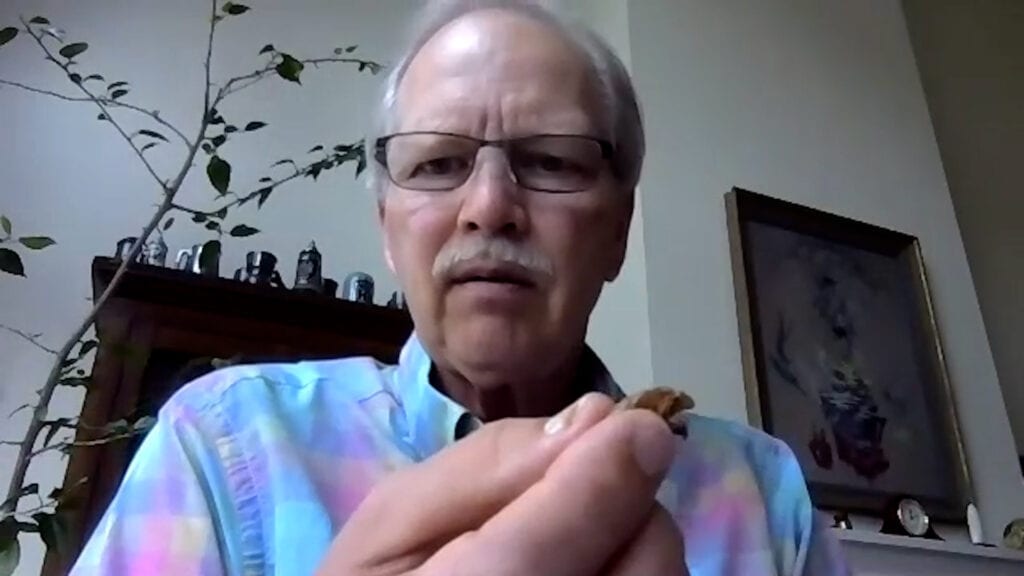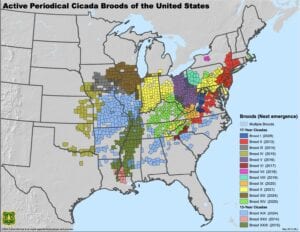Massive Cicada Event to Swarm Southeast

Dr. Hale presents a cicada husk
Break out the ear plugs because East Tennessee is in for a treat this summer– Brood X.
Brood X is what scientists call the massive cicada event the Southeast will see this May when the insects make their way above ground to transition into adulthood and reproduce.
But how many cicadas will we see?
“We would supposedly be in the billions; this is probably the largest 17-year brood,” said Dr. Frank Hale, a professor of entomology at the University of Tennessee. “You could have over a million per acre.”

When Dr. Hale mentions a “17-year brood” he is referring to the life cycle of a cicada. Cicadas spend their early lives underground feeding on tree roots. They then emerge from underground for the adult portion of their lives.
The interesting part is the timing; cicadas tend to all come up at once in massive cycles called broods. This year’s, Brood X, runs on a 17-year cycle. Dr. Hale says this is a way for cicadas to combat predators. He calls it a “reproductive strategy.”
“When it comes to something like cicadas, one strategy is to overwhelm predators with their numbers,” he said. The idea is that no amount of predators will be able to eat billions of the insects, so they will be free to reproduce.
That’s not all, however; the timing itself also plays a part in avoiding predators. By waiting so long underground, cicadas avoid specialized predators that would normally feed on them year after year.
If you’re familiar with cicadas at all, you will know that males make a loud whining noise to attract mates. This year, Dr. Hale says we can expect Brood X’s mating call to make quite the ruckus.
“We just hear it collectively as a very loud, maybe up to 100 decibel din,” he said. That’s louder than a subway train, according to the Hearing Health Foundation. Take a listen:
Source: USDA Agricultural Research Service
Cicadas are harmless to humans. Your garden, however, isn’t so safe. “In general they’re going to attack trees, maybe shrubs. They go after pencil-sized twigs to lay their eggs,” Dr. Hale said.
Stay away from insecticide, though. Dr. Hale says it doesn’t act fast enough to stop females from laying eggs. Instead, he recommends covering plants with something like cheesecloth or an old sheet with holes no bigger than 1/8 inch.
“That physically stops the female cicada from laying eggs on the twigs and causing damage,” he said.
“They’re related to shrimp and crab and lobster,
and we eat those don’t we?”
Dr. Hale says cicadas are more than just a septdecennial (yes, that’s the word for every 17 years) annoyance; they’re also a great source of protein.
That’s right, you can eat cicadas. “After all,” said Dr. Hale, “they’re related to shrimp and crab and lobster, and we eat those don’t we?”
While the idea of eating insects is a bit odd here in the U.S., plenty of other cultures have embraced it. “African cultures, Asian cultures, other places, they do eat insects,” Hale said.
The idea is becoming more mainstream as well, given this year’s event. Outlets like National Geographic and the Smithsonian are posting recipes in preparation. A quick search on Amazon even revealed a plethora of cicada-centric cookbooks.
It actually makes a lot of sense to eat insects. Cicadas especially are a great source of inexpensive, high quality protein, according to Dr. Hale. He even says cicadas can be ground into flour and used to make a high-protein bread.
It might be a challenge to make a meal from insects, but like Dr. Hale says, “if you’re a good cook you can make anything taste good.”
Camruinn Morgan-Rumsey is a Senior majoring in Journalism and Electronic Media and minoring in Business Management. On campus, he has worked as a photographer for the Daily Beacon, the student-run UT newspaper. He has also worked on production for Unwarranted, a program on the Volunteer Channel. Professionally, he has worked as an Operations Technician for WATE-TV, a local TV news station in Knoxville. Camruinn plans to work as a reporter for a legacy news outlet in a large market.

